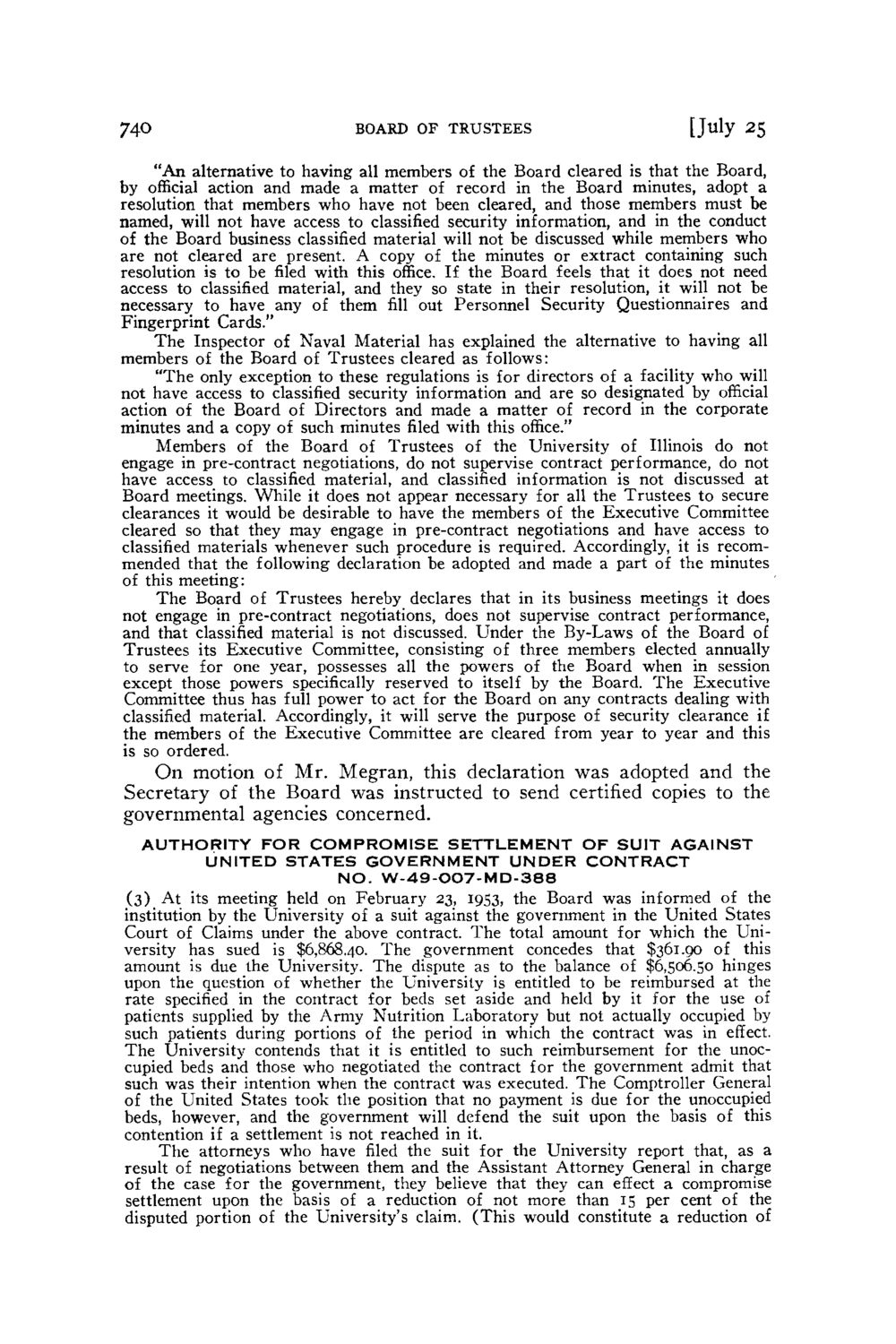| |
| |
Caption: Board of Trustees Minutes - 1954
This is a reduced-resolution page image for fast online browsing.

EXTRACTED TEXT FROM PAGE:
740 BOARD OF TRUSTEES [July 25 "An alternative to having all members of the Board cleared is that the Board, by official action and made a matter of record in the Board minutes, adopt a resolution that members who have not been cleared, and those members must be named, will not have access to classified security information, and in the conduct of the Board business classified material will not be discussed while members who are not cleared are present. A copy of the minutes or extract containing such resolution is to be filed with this office. If the Board feels that it does not need access to classified material, and they so state in their resolution, it will not be necessary to have any of them fill out Personnel Security Questionnaires and Fingerprint Cards." The Inspector of Naval Material has explained the alternative to having all members of the Board of Trustees cleared as follows: "The only exception to these regulations is for directors of a facility who will not have access to classified security information and are so designated by official action of the Board of Directors and made a matter of record in the corporate minutes and a copy of such minutes filed with this office." Members of the Board of Trustees of the University of Illinois do not engage in pre-contract negotiations, do not supervise contract performance, do not have access to classified material, and classified information is not discussed at Board meetings. While it does not appear necessary for all the Trustees to secure clearances it would be desirable to have the members of the Executive Committee cleared so that they may engage in pre-contract negotiations and have access to classified materials whenever such procedure is required. Accordingly, it is recommended that the following declaration be adopted and made a part of the minutes of this meeting: The Board of Trustees hereby declares that in its business meetings it does not engage in pre-contract negotiations, does not supervise contract performance, and that classified material is not discussed. Under the By-Laws of the Board of Trustees its Executive Committee, consisting of three members elected annually to serve for one year, possesses all the powers of the Board when in session except those powers specifically reserved to itself by the Board. The Executive Committee thus has full power to act for the Board on any contracts dealing with classified material. Accordingly, it will serve the purpose of security clearance if the members of the Executive Committee are cleared from year to year and this is so ordered. O n m o t i o n of M r . M e g r a n , t h i s d e c l a r a t i o n w a s a d o p t e d a n d t h e S e c r e t a r y of t h e B o a r d w a s i n s t r u c t e d t o s e n d c e r t i f i e d c o p i e s t o t h e governmental agencies concerned. AUTHORITY FOR COMPROMISE SETTLEMENT OF SUIT AGAINST UNITED STATES GOVERNMENT UNDER CONTRACT NO. W - 4 9 - 0 0 7 - M D - 3 8 8 (3) At its meeting held on February 23, 1953, the Board was informed of the institution by the University of a suit against the government in the United States Court of Claims under the above contract. The total amount for which the University has sued is $6,868.40. The government concedes that $361.90 of this amount is due the University. The dispute as to the balance of $6,506.50 hinges upon the question of whether the University is entitled to be reimbursed at the rate specified in the contract for beds set aside and held by it for the use of patients supplied by the Army Nutrition Laboratory but not actually occupied by such patients during portions of the period in which the contract was in effect. The University contends that it is entitled to such reimbursement for the unoccupied beds and those who negotiated the contract for the government admit that such was their intention when the contract was executed. The Comptroller General of the United States took the position that no payment is due for the unoccupied beds, however, and the government will defend the suit upon the basis of this contention if a settlement is not reached in it. The attorneys who have filed the suit for the University report that, as a result of negotiations between them and the Assistant Attorney General in charge of the case for the government, they believe that they can effect a compromise settlement upon the basis of a reduction of not more than 15 per cent of the disputed portion of the University's claim. (This would constitute a reduction of
| |